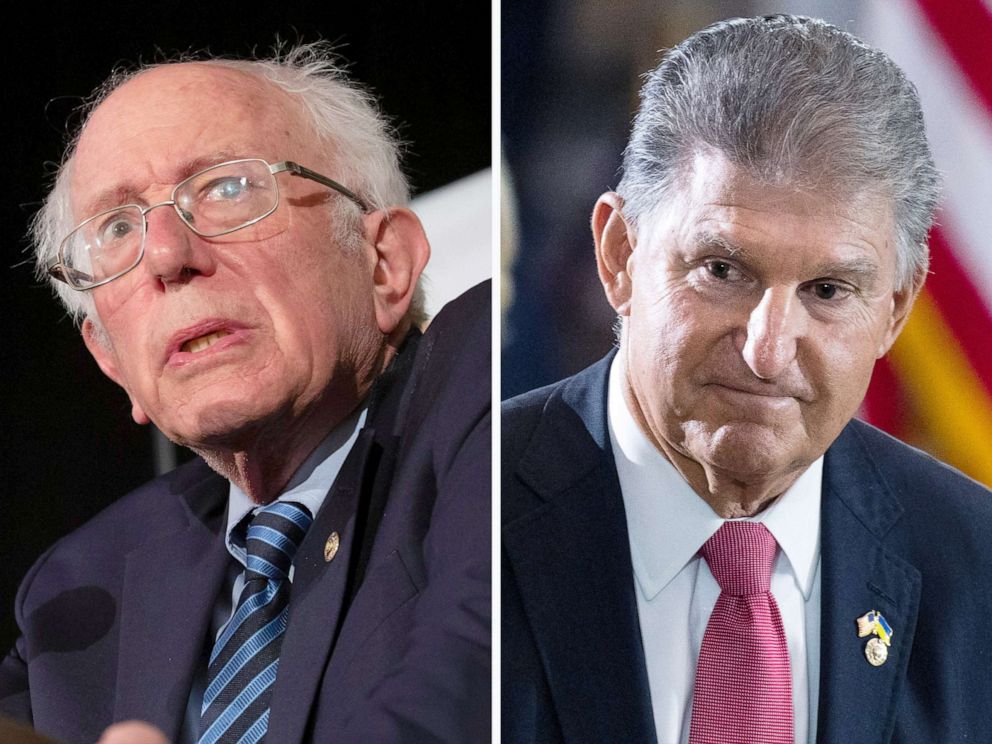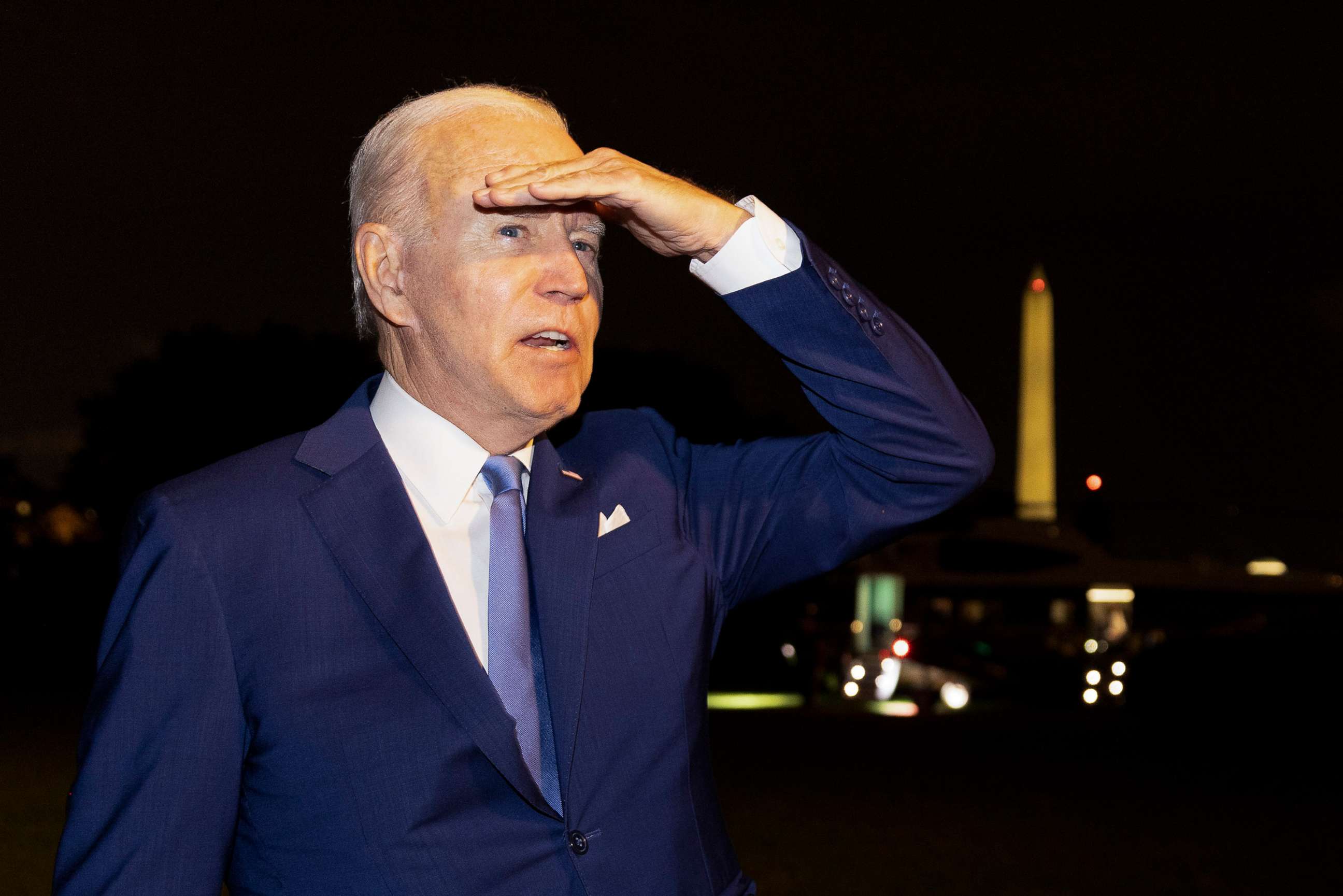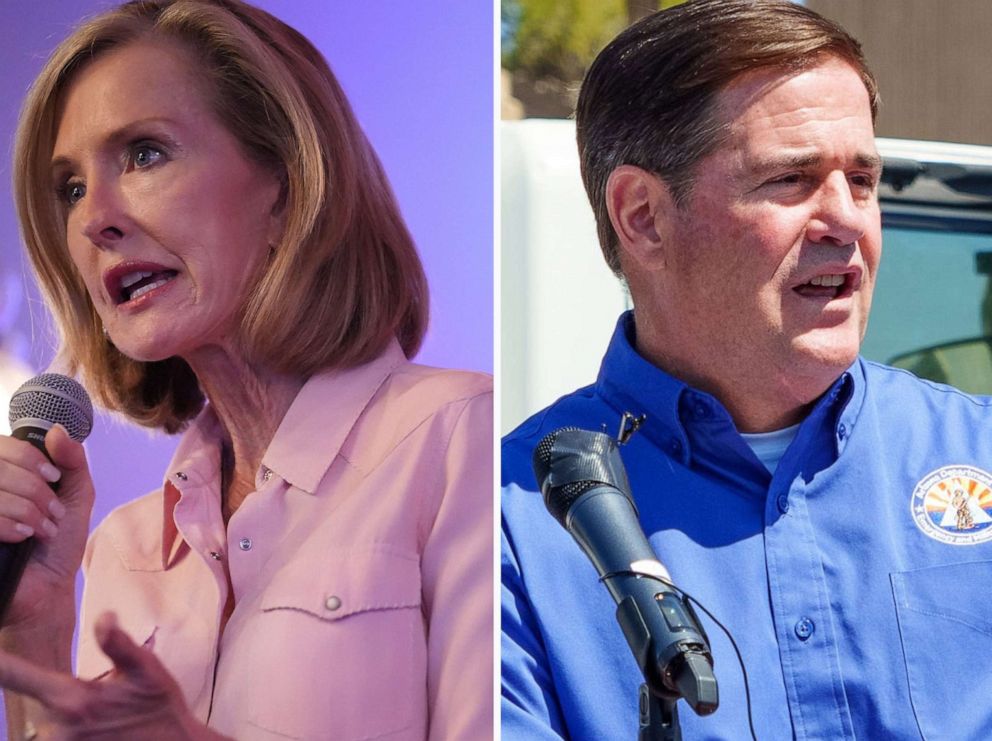Democrats' infighting threatens to overshadow remaining agenda: The Note
Despite a stinging rebuke on Sunday, progressives still need Joe Manchin.
The TAKE with Rick Klein
It's harder to focus on what you've done as a party so long as attention falls on what you aren't able to do.
As for what might still get done, that's more difficult to know as well in the context of uncommon division over who's to blame about a Democratic Party agenda that's mostly -- though not entirely -- stalled ahead of the midterms.
Climate change, gun violence, inflation, basic affordability, democracy itself -- all leave Democrats blaming fellow Democrats in addition to Republicans for the lack of policy solutions ahead of an election they agree figures to be brutal.
The move by Sen. Joe Manchin, D-W.Va., to torpedo Democrats' climate-change efforts, citing fears of runaway inflation, brought a total rebuke on Sunday from perhaps the highest-profile progressive in Congress.
"He has sabotaged the president's agenda," Sen. Bernie Sanders, I-Vt., told Martha Raddatz on ABC's "This Week." "The problem was that we continue to talk to Manchin like he was serious. He was not."
Democrats, of course, still need Manchin's vote on key health care measures he might yet support, including Affordable Care Act subsidies and drug-pricing reform. The White House hopes climate measures can stay in the mix as well, with executive actions and -- assuming inflation eases in the next round of reports -- even pre-midterm bills in Congress.
This summer has brought an unusual dynamic where Democrats' hopes in Congress, specifically their bid to keep control of the Senate, look a bit brighter even as President Joe Biden's political prospects look dimmer.
But they need each other to make what policy progress they can in the coming weeks. That will mean having to find another dose of party unity, despite reasons that might be lacking.

The RUNDOWN with Averi Harper
President Biden returned to Washington on Saturday without any clear payoffs from his first Middle East trip as commander-in-chief.
Among Biden's most pressing goals for the trip was encouraging countries in the region to increase oil production in hopes of driving down gas prices -- including in the U.S. -- but there were no new commitments on that front.
If anything, Biden's fist-bump seen around the world with Saudi Crown Prince Mohammed bin Salman overshadowed much of the trip, drawing backlash from both the fiancée and the former employer of slain journalist Jamal Khashoggi, a Saudi dissident and Washington Post writer whom the U.S. believes bin Salman had killed. (The crown prince denies this.)
Washington Post publisher and CEO Fred Ryan issued a statement calling the greeting between Biden and bin Salman "shameful." Hatice Cengiz, who intended to marry Khashoggi before his 2018 murder, tweeted that "the blood of MBS's next victim is on [Biden's] hands."
"I'm sorry she feels that way," Biden said when asked Friday about Cengiz's tweet.
The administration maintains that, despite any major disagreements the White House may have with the Middle East's leaders, meetings with Saudis and others are important to U.S. efforts on numerous issues, including confronting the threat of Iran's emerging nuclear program, combating the fallout from the war in Ukraine and competing with China.
"There is a huge agenda of U.S. national security interests at play in the Middle East and you're not going to advance those interests if you just stay at home and try to phone it in," White House spokesman John Kirby told ABC News. "You have to actually go and speak to leaders and be on the ground to try to make a difference."

The TIP with Alisa Wiersema
The tensions in Arizona's Republican gubernatorial primary rose to new heights over the weekend as term-limited GOP Gov. Doug Ducey blasted Donald Trump-backed candidate Kari Lake over her false election denial claims. With just two weeks left until the state's Aug. 2 nominating contests, the divide further exposes the trending political chasm between Trump and several battleground state Republican governors who appear to be attempting to push the discourse away from 2020 election lies.
"Kari Lake is misleading voters with no evidence. She's been tagged by her opponents with a nickname, 'Fake Lake,' which seems to be sticking and actually doing some damage," Ducey said on Sunday during a CNN interview, in reference to Lake's focus on challenging the outcome of the last presidential election.
The Arizona governor praised his chosen primary candidate, Karrin Taylor Robson, for her "pro-wall, pro-gun, pro-life" policy stances and called her "the real conservative" in the race.
But Ducey, who serves as chair of the Republican Governors Association, also sidestepped answering whether the RGA would support election-denying gubernatorial candidates in general elections, saying the organization is "on offense, but we don't support lost causes." Ducey pushed back on CNN when pressed about whether Pennsylvania's election-denying gubernatorial Republican nominee, Doug Mastriano, could be considered a "lost cause."
"No, I didn't say 'lost cause' in any category yet [...] Nov. 8 is a long way off," he said.
Although Ducey went on to say the RGA would be examining its resources on the gubernatorial electoral map, he also added that he believes "the people of any state would be better served by a governor who believes in the people."
"I also think this election should be about the future. I don't think we should think for one more moment about 2020," he said.
Lake, responding to Ducey's comments, tweeted that his CNN interview was "so sad."

NUMBER OF THE DAY, powered by FiveThirtyEight
120. That's the number of Republican candidates running for the U.S. House, U.S. Senate, governor, secretary of state and attorney general who have denied the 2020 election was legitimate and will be on the ballot this fall. An additional 48 nominees have expressed doubts about the election. Just 75 nominees have fully accepted or partially accepted the 2020 election results so far. Read more from FiveThirtyEight's Nathaniel Rakich and Kaleigh Rogers on how the legitimacy of the 2020 presidential election has continued to be questioned in Republican primaries so far.
ONE MORE THING
Steve Bannon's trial on federal contempt-of-Congress charges begins Monday in Washington, with jury selection. Bannon, who previously served as Trump's White House chief strategist but departed in August 2017, was first subpoenaed by the House's Jan. 6 committee for records and testimony in September -- but he defied that order. Bannon's attorneys have repeatedly claimed that Trump had invoked executive privilege over Bannon's testimony, which prevented him from cooperating -- despite Trump's status as a former president and the fact that Bannon was not a White House adviser at the time. But the Justice Department revealed last week that in a recent interview with federal investigators, Trump's current lawyer, Justin Clark, said that at no point did Trump actually invoke executive. https://abcn.ws/3osYt7v
THE PLAYLIST
ABC News' "Start Here" Podcast. "Start Here" begins Monday morning with ABC News contributor John Brownstein on the latest COVID-19 subvariant, BA.5. Then, ABC’s MaryAlice Parks previews Steve Bannon’s contempt of Congress trial and explains a Secret Service subpoena for deleted texts from Jan. 6, 2021. And, ABC’s Aaron Katersky breaks down a new report on the Uvalde, Texas, school shooting that found "systemic failures." http://apple.co/2HPocUL
WHAT YOU NEED TO KNOW TODAY
- Jury selection is set to begin in the trial of Trump's ally Steve Bannon over his defiance of a subpoena from the House select committee investigating the Jan. 6 attack on the U.S. Capitol.
- White House press secretary Karine Jean-Pierre holds a press briefing at 3 p.m. ET.
Download the ABC News app and select "The Note" as an item of interest to receive the day's sharpest political analysis.
The Note is a daily ABC News feature that highlights the day's top stories in politics. Please check back Tuesday for the latest.




